English Words in Action, Group Q
(a variety of English words which have developed through history and are currently used in our modern age)
Simply click on this banner (or the following link) and you will be on your way to stimulate your brain for greater word comprehension with quizzes based on some of the words in this unit.
2. A charlatan, a phony or a fake: Dana realized that the psychiatrist was really a quack and so she decided to go to the clinic for help.
3. Etymology: a quack or "fake doctor", is a short form of quacksalver, from Dutch kwakzalver, "charlatan".
Dutch kwakken means "to quack", so the word may originally have meant "someone who quacks boastfully, like a duck, about his salve or other medical remedies".
2. A predicament, serious difficulty, a precarious situation: The representative of the IMF (International Monetary Fund) stated that the EU (European Union) will need more than diplomacy to get Greece out of its financial quagmire.
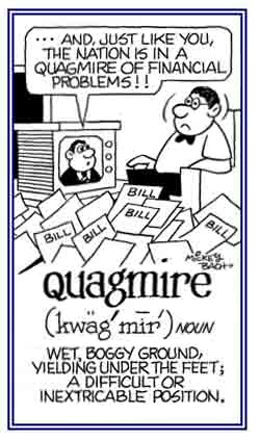
Go to this Word A Day Revisited Index
so you can see more of Mickey Bach's cartoons.
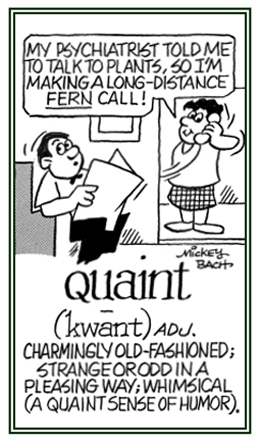
Go to this Word A Day Revisited Index
so you can see more of Mickey Bach's cartoons.
2. A bodily shivering, an agitation, a nervous expression of fear or anxiety: A quake of fear passed through the family when they saw the lightening and heard the loud thunder.
2. Skills, abilities, training, suitability: Thomas had the necessary qualifications to do the repair work for the house.
3. Provisos, conditions, limitations: The contract has several qualifications for the employees.
2. Guarded, tentative, conditional: Brian gave a qualified answer when he was asked to give definite assurances that Melba could get the flight out that evening.
2. To modify, to enhance, to change: The head of the company said the employees were not permitted to make any changes, but later he decided to qualify his answer.
3. To describe, to make more specific: In grammar, adjectives are words that qualify nouns.
The workers had many qualms as to whether the company's plans were practical.
2. Etymology: The origin of the word is uncertain, although the original English definition meant "illness" or "disease".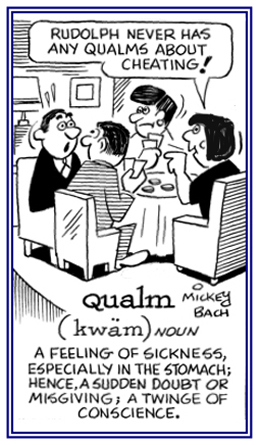
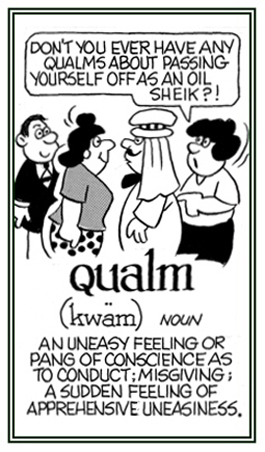
Go to this Word A Day Revisited Index
so you can see more of Mickey Bach's cartoons.
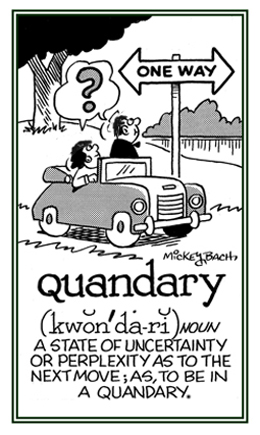
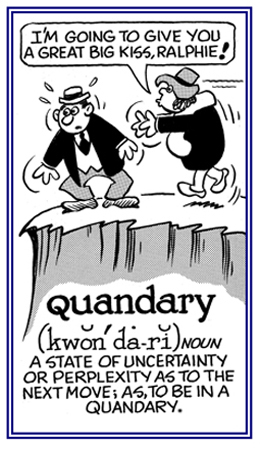
Go to this Word A Day Revisited Index
so you can see more of Mickey Bach's cartoons.
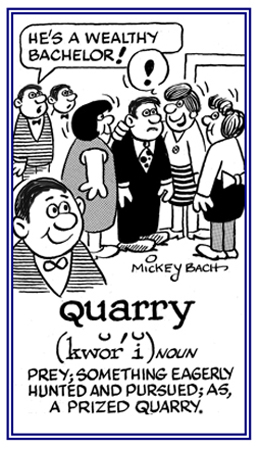
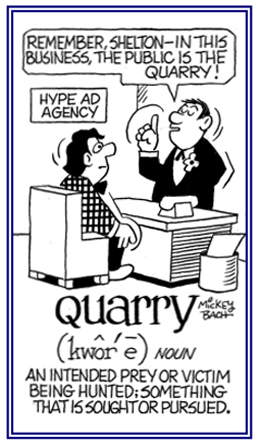
Go to this Word A Day Revisited Index
so you can see more of Mickey Bach's cartoons.
Quell, "suppress", and "subdue" all mean to put an end to a disturbance; such as, a riot or a revolt, by the use of persuasion or by force.
To quell an uprising, authorities may employ either persuasion or force, or both; and the word suggests taking measures to discourage the participants in order to keep the situation from getting out of control.
When used in a figurative sense, quell may merely mean to quiet or to reduce the intensity of or to calm, as certain feelings; for example, to quell fears.
2. To subdue, to calm, or to reduce something; such as fear or worry: Jimmy's mother quelled him with a strong look because he was making too much noise.Karl quelled his wife's fears about the thunderstorm that was going on by holding her in his arms and calmly reassuring her that everything would be all right.
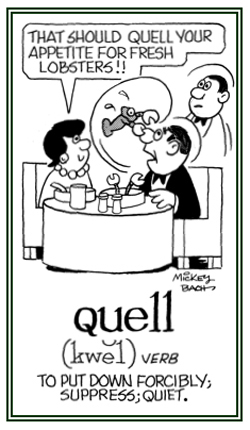
Go to this Word A Day Revisited Index
so you can see more of Mickey Bach's cartoons.
Cleo and Bette had quibbles about the bus being five minutes late because of the slow traffic.
2. To present objections about insignificant things: People quibbled about the length of the speech and said nothing about its main content.
Shawn was quibbling about the amount that the bookstore was charging for the small publication.
Links to all of the groups of English words in action, Groups A to Z.
You may see the bibliographic list of sources of information for these words in action.

